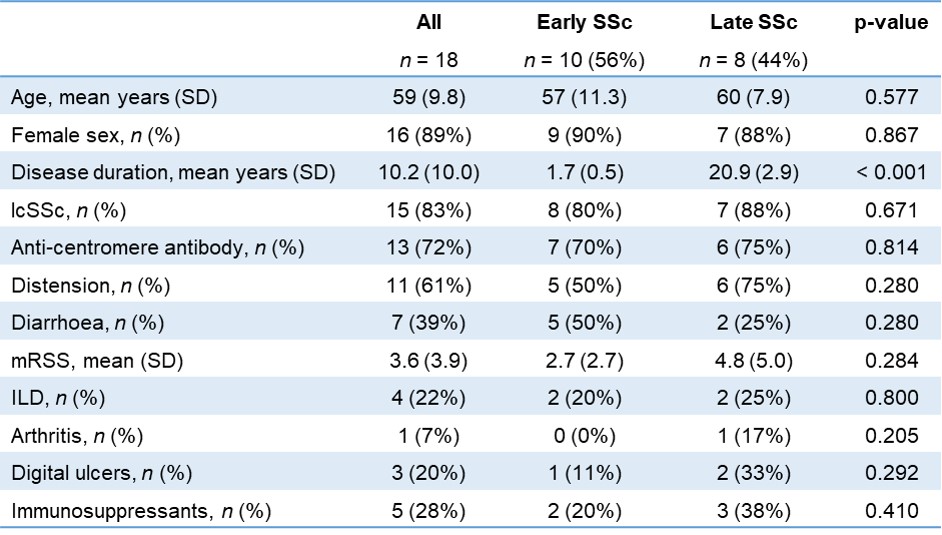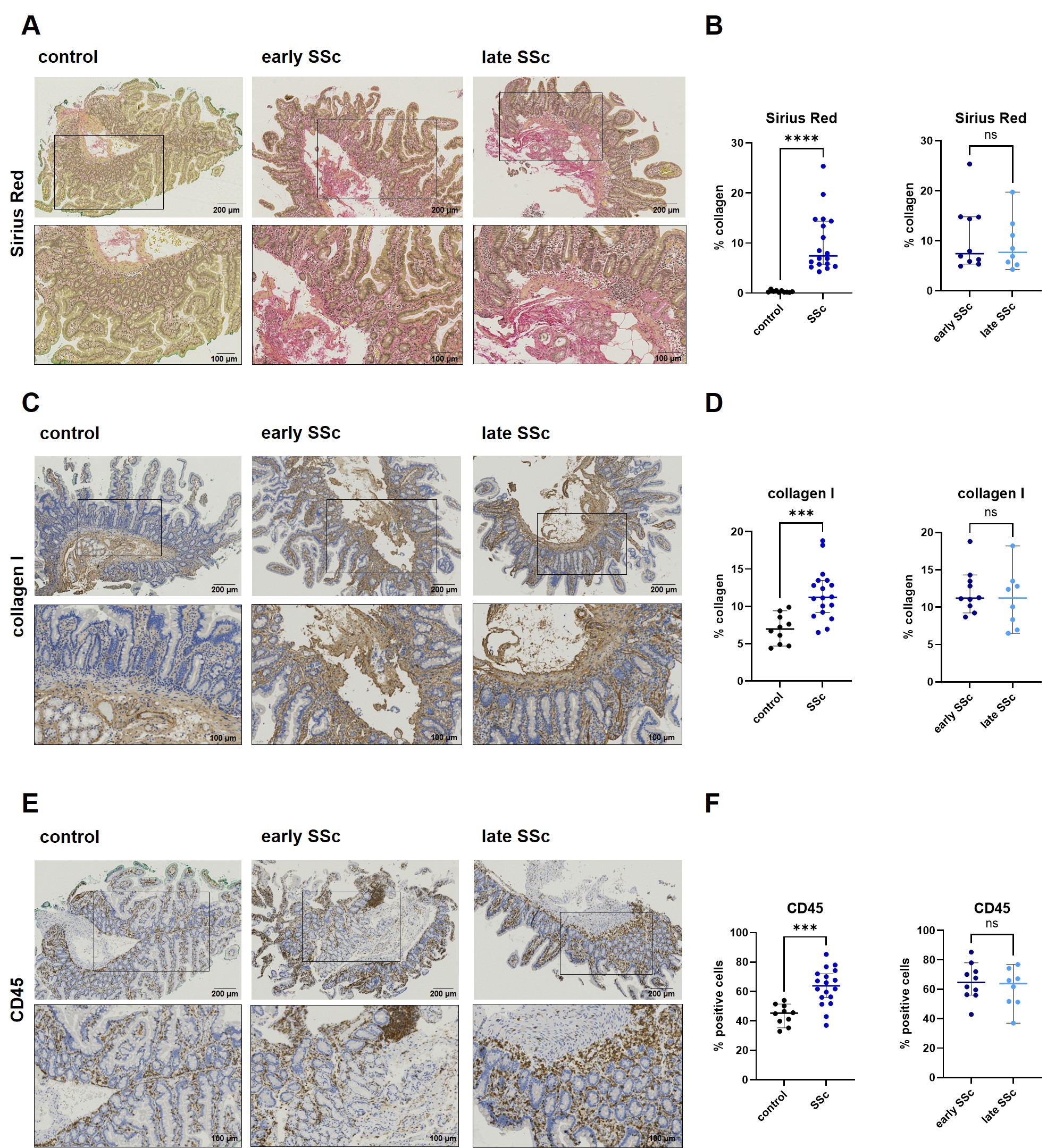Session Information
Date: Sunday, November 17, 2024
Title: Systemic Sclerosis & Related Disorders – Basic Science Poster I
Session Type: Poster Session B
Session Time: 10:30AM-12:30PM
Background/Purpose: Gastrointestinal tract (GIT) involvement is highly prevalent among patients with systemic sclerosis (SSc) and is associated with high morbidity and mortality. However, treatment options are limited. The pathogenesis underlying GIT involvement in SSc remains largely unexplored. There is limited understanding of how the aberrant molecular mechanisms change during the early and late disease phases. Filling these knowledge gaps are critical to identifying and implementing novel treatment options. Our study aimed to elucidate molecular alterations in the duodenal tissue of SSc patients across different disease stages compared to control tissue.
Methods: We studied gastroduodenal biopsies from SSc patients taking part in the ReSScue trial with moderate to severe symptomatic lower GIT involvement as well as from control individuals with non-celiac gluten sensitivity. Hematoxylin and Eosin (H&E) staining was carried out to assess the morphology and structure. The samples were stained with Sirius Red to detect collagen deposition and further analyzed with immunohistochemistry (IHC), using anti-collagen I. Anti-podoplanin and anti-CD34 were used to stain lymphatic cells and blood vessels, respectively. Inflammation was analyzed with anti-CD45 as a general marker for leukocytes, anti-CD3 for T-cells and anti-CD20 for B-cells. The percentage of tissue stained with Sirius Red and collagen I was quantified with Orbit Image Analysis. For IHC stainings, QuPath was used to determine the percentage of positively stained cells.
Results: We assessed duodenal samples from 10 SSc patients with early (mean disease duration 1.7 years), 8 with late disease (mean disease duration 20.9 years) and 10 non-SSc-controls. The two groups of SSc patients did not differ in other clinical parameters (Tab. 1). We identified increased fibrotic changes with enhanced collagen deposition by Sirius Red staining (7.44% versus 0.25%; p < 0.001) and significantly increased levels of collagen I (11.2% versus 7.0%; p < 0.001) in SSc patients compared to controls. However, we observed no differences between early and late disease. We found increased inflammation with an abundance of leukocytes in SSc patients compared to non-SSc controls (63.9% versus 45.3%; p < 0.001; Fig. 1). T-cells were significantly reduced in SSc samples compared to controls (29.6% versus 34.6%; p = 0.01), but we did not observe significant differences in CD-20 B-cells between SSc and non-SSc controls. No significant differences were detected between biopsies from early and late SSc patients for all inflammatory markers. Also, no vascular alterations were observed across all compared groups.
Conclusion: Our data demonstrate alterations of fibrosis and inflammatory markers in duodenal biopsies of SSc patients, but interestingly no changes between early and late stage SSc. The presence of fibrosis early in the disease and sustained inflammation over the disease course could inform clinical decision-making and eventually assist in making gut-related treatment decisions. Transcriptomic and proteomic analysis of SSc GIT tissue will provide more insight into the molecular alterations of GIT involvement in SSc.
lcSSc = limited cutaneous SSc, mRSS = modified Rodnan skin score, ILD = Interstitial lung disease.
To cite this abstract in AMA style:
Much L, Pachera E, Laimbacher A, Didriksen H, Aabakken L, Lundin K, Li L, Hofman A, Bearzi P, Wagner S, Scharl M, Molberg Ø, Fretheim H, Distler O, Hoffmann-Vold A. Increased Collagen Deposition and Altered Immune Cell Profiles Are Present in Early and Late Stage Systemic Sclerosis with Gastrointestinal Involvement [abstract]. Arthritis Rheumatol. 2024; 76 (suppl 9). https://acrabstracts.org/abstract/increased-collagen-deposition-and-altered-immune-cell-profiles-are-present-in-early-and-late-stage-systemic-sclerosis-with-gastrointestinal-involvement/. Accessed .« Back to ACR Convergence 2024
ACR Meeting Abstracts - https://acrabstracts.org/abstract/increased-collagen-deposition-and-altered-immune-cell-profiles-are-present-in-early-and-late-stage-systemic-sclerosis-with-gastrointestinal-involvement/


